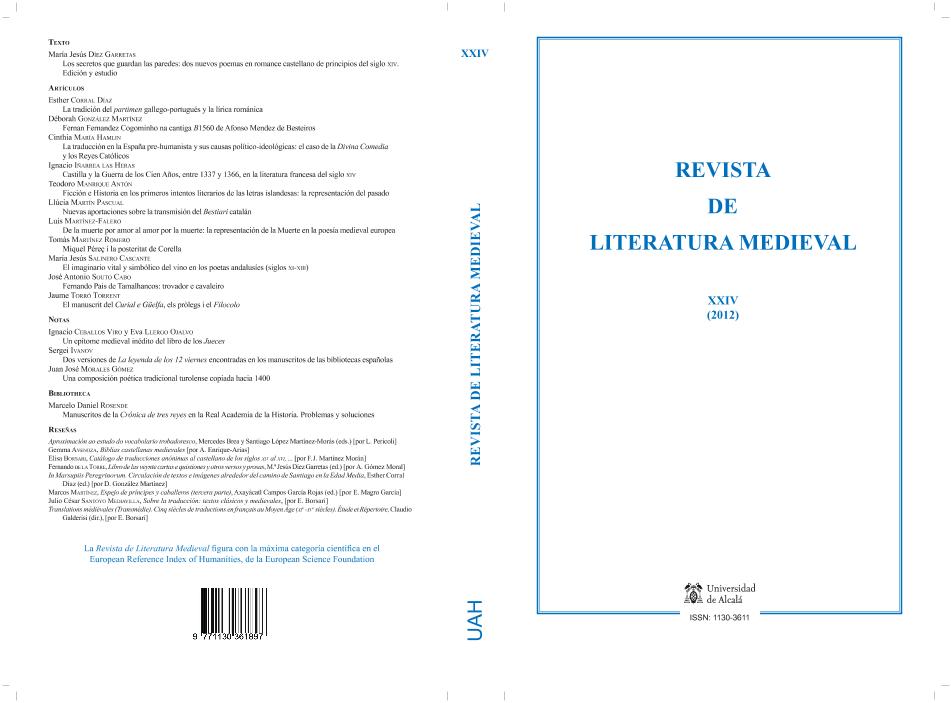Mostrar el registro sencillo del ítem
dc.contributor.author
Hamlin, Cinthia Maria

dc.date.available
2020-11-13T20:26:22Z
dc.date.issued
2012-11
dc.identifier.citation
Hamlin, Cinthia Maria; La traducción en la España pre-humanista y sus causas político-ideológicas: el caso de la "Divina Comedia" y los Reyes Católicos; Universidad de Alcalá; Centro de Estudios Cervantinos; Revista de Literatura Medieval; 24; 11-2012; 81-100
dc.identifier.issn
1130-3611
dc.identifier.uri
http://hdl.handle.net/11336/118363
dc.description.abstract
En el presente artículo intentamos indagar en los intereses político- ideológicos en los que emerge la primera traducción impresa de la Divina Comedia (1515), partiendo de la hipótesis de que la concepción política de Dante respecto del único “Imperio cristiano” que en la Divina Comedia toma forma poética y llega a su punto álgido en las profecías que señalan la llegada del Emperador, encaja perfectamente con el “mesianismo” del que se tiñen todos los textos del período y que señalan a los Reyes Católicos como los que vienen a ordenar el período de “anarquía” previo. El discurso profético del que se sirven estos textos es, en realidad, un medio propagandístico impulsado por la Corona para, en un primer momento, legitimarse y, más adelante, para justificar la política imperialista de Fernando de Aragón. Luego del estudio de algunos factores histórico-culturales del reinado de los Reyes Católicos, intentaremos probar la existencia de una relación entre el arcediano de Burgos Pedro Fernández de Villegas y la corte regia, para adentrarnos luego en el estudio de algunos pasajes de la traducción del primer canto, cuyas variantes respecto del original no harían más que respaldar nuestras hipótesis
dc.description.abstract
In the present article we will try to examine the political and ideological interests in which the first printed translation of the Divine Comedy (1515) emerged, based on the hypothesis that Dante’s political conception regarding the one “Christian Empire”, which in the Divine Comedy takes poetic form and reaches its climax in the prophecies about the arrival of the Emperor, suits perfectly with the “messianism” that pervades all the texts of the period and that points out at the Catholic Kings as those who come to put in order the previous period of “anarchy”. The prophetic discourse used in this texts is, in fact, just a mean of propaganda promoted by the Crown to, in a first moment, legitimate itself and, afterwards, to justify Fernando de Aragón’s imperialistic policy. After the study of some historical and cultural factors of the Catholic Monarchs’ kingship, we will try to prove the relationship between the Archdeacon of Burgos Pedro Fernández de Villegas and the royal court; then, we will focus on the study of some passages of the translation of the first canto, whose variants in relation to the original support our hypotheses
dc.format
application/pdf
dc.language.iso
spa
dc.publisher
Universidad de Alcalá; Centro de Estudios Cervantinos
dc.rights
info:eu-repo/semantics/openAccess
dc.rights.uri
https://creativecommons.org/licenses/by-nc-sa/2.5/ar/
dc.subject
TRADUCCIÓN DIVINA COMEDIA
dc.subject
PROPAGANDA REGIA
dc.subject
DISCURSO PROFÉTICO
dc.subject
MESIANISMO
dc.subject.classification
Literaturas Específicas

dc.subject.classification
Lengua y Literatura

dc.subject.classification
HUMANIDADES

dc.title
La traducción en la España pre-humanista y sus causas político-ideológicas: el caso de la "Divina Comedia" y los Reyes Católicos
dc.type
info:eu-repo/semantics/article
dc.type
info:ar-repo/semantics/artículo
dc.type
info:eu-repo/semantics/publishedVersion
dc.date.updated
2020-09-03T17:01:40Z
dc.journal.number
24
dc.journal.pagination
81-100
dc.journal.pais
España

dc.journal.ciudad
Alcalá de Henares (Madrid)
dc.description.fil
Fil: Hamlin, Cinthia Maria. Consejo Nacional de Investigaciones Científicas y Técnicas. Oficina de Coordinación Administrativa Saavedra 15. Instituto de Investigaciones Bibliográficas y Crítica Textual. IIBICRIT - Subsede "Seminario Orduna"; Argentina. Universidad de Buenos Aires; Argentina
dc.journal.title
Revista de Literatura Medieval
dc.relation.alternativeid
info:eu-repo/semantics/altIdentifier/url/https://ebuah.uah.es/dspace/handle/10017/19876
dc.relation.alternativeid
info:eu-repo/semantics/altIdentifier/url/https://dialnet.unirioja.es/servlet/articulo?codigo=4099650
Archivos asociados
